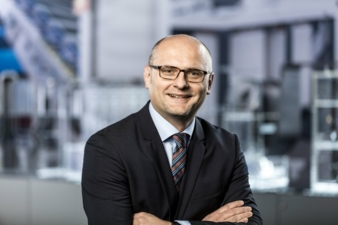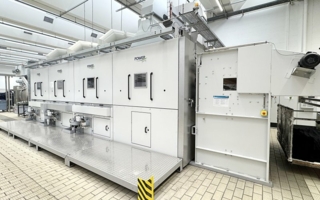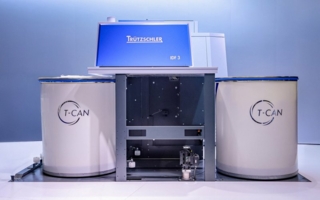19/06/2019 – ITMA 2019 — auf Deutsch lesen
Focus Industry 4.0
The future of the textile industry is more and more determined by Industry 4.0. Industry 4.0 has many dimensions and possible fields of application.
In three of them (Smart Services, Operations and Factory), key solutions are provided by the machinery industry. The other ones from smart textile products, marketing and sales, employees up to strategy and organization are specific know-how issues for textile mills.
Nicolai Strauch, press officer of the VDMA Textile Machinery Association, Germany, spoke to Rainer Mestermann, Managing Director, Mahlo, Axel Pieper, CEO, Brückner Trockentechnik, Eric Schöller, Managing Director, Groz-Beckert and Dr Christof Soest, CTO, Trützschler about their products and services with regard to digitization and Industry 4.0.
Trützschler
Strauch: Dr Soest, what is Trützschler’s latest I4.0 innovation?
Dr Soest: We have developed intelligent, self-optimizing machines and connect them through digital monitoring systems. The latest examples are cloud-based monitoring solutions which enable customers to literally steer and optimize their spinning mill anytime from anywhere in the world. This combination of complete, intelligent machinery solutions and digital support systems means a big step in automation and ensuring high quality. Customer benefits range from improved productivity and quality to fewer downtimes, machine failures and reduced scrap.
Groz-Beckert
Strauch: Integral parts in knitting, warp knitting and sewing are needles. Mr. Schöller, will needle handling also move to a digital level?
Schöller: Yes, indeed. Groz-Beckert has developed a quality and life cycle management system for needles. It organises each needle in a clearly structured process and documents them digitally, from arriving at the factory to leaving for recycling. This quality management system makes it possible to efficiently conduct
Brückner
Strauch: Mr. Pieper, in textile finishing, energy consumption plays a crucial role. Can I4.0-solutions help to reduce energy costs?
Pieper: Brückner has developed an intelligent machine assistance system that monitors the settings of the entire system in the background. During production for example, a production assistance system helps the operator to decide which parameters need to be adjusted to make the system even more energy-efficient and productive. At the customer's request, we can also connect his system to a higher-level control station system. Productivity increases of up to 40 percent and a reduction in energy consumption of up to 30 percent are possible.
Mahlo
Strauch: Mr. Mestermann, company Mahlo develops and produces measurement and control equipment for the textile and nonwoven industry. A basic idea of Industry 4.0 is collecting and processing data for better production results. How is Mahlo addressing this issue?
Mestermann: A new platform from Mahlo realizes these ideas of industry 4.0 with digital technologies. In the digitization concept for all Mahlo products, the functionalities are grouped, optimized and standardized as “services”. The new platform makes it easier for customers to use data in a meaningful manner to optimize their processes. Networking of Mahlo devices with each other and with other systems ensures consistent data exchange and enables the bundling of information as a basis for process improvement. Higher machine availability through remote maintenance via better product quality by adaptive control or flexible data analysis as the basis for better decisions provide immediate monetary benefits. Evaluations confirmed by customers prove that the control module regulates 20 percent faster and more precisely than before. Better straightening results reduce the production of second-choice goods and the need to pass the same fabric through the stenter several times.





